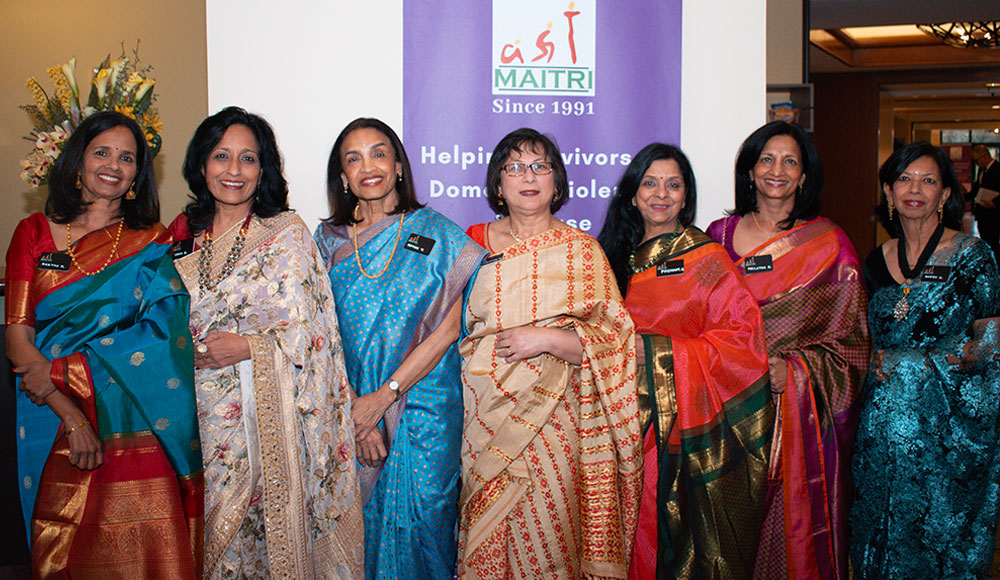This Saturday, the nonprofit organization Maitri celebrates 34 years of combating domestic violence in South Asian diasporas. With an annual gala set to raise at least six figures, Maitri members take joy in reflecting on all they’ve accomplished over the decades.
“Within Maitri, we always say it is one of those typical successful Silicon Valley startup stories where somebody starts something in the garage and it becomes really big,” said Geetha Krishnamurthy, Matri’s president of the board. “That’s exactly how it started.”
In 1991, four South Asian women who lived close to each other, young working mothers, started noticing the increasing presence of young women who were lost after facing a variety of abusive situations in their homes. Such women didn’t know where to go for help. Some were on H-4 visas. Many didn’t have close friends outside their own families.
Instead of starting an elaborate organization, the founders assembled a binder of all the resources available within the mainstream American domestic violence support system and then launched a simple referral service. To advertise, they often put flyers in Indian grocery stores. They set up an answering machine in one of their kitchens. Nobody had cell phones yet. The founders took turns answering or returning the calls.
When calls started pouring in, the founders realized much more needed to be done. Cultural dynamics specific to South Asian diasporas could not be adequately accommodated by the American system. For example, in Indian immigrant communities, the in-laws back home often encouraged the abusive behavior, even over the phone. It was awful.
“In every culture there is patriarchy, but in Indian culture, it becomes part of your culture,” Krishnamurthy explained, adding examples of horrific things that are often said: “‘Oh, he’s your husband, you need to adjust. You are the woman. It is your job, and you have girl children. How are your girl children going to get married if you leave him or if you report him?’”
That’s only one problem. Another is the fear of being deported. The abusive partner might threaten the H-4 visa status of his wife if she divorces him, which is not how the laws even work, but survivors of abuse often don’t know the laws. Throw in language difficulties, a lack of friends outside the partner’s direct circle, and the whole mess becomes quite difficult to address in the mainstream American support system.
As a result, Maitri grew and grew. The founders added more volunteers, more legal services and a fully dedicated help line in multiple languages.
“Depending on the needs of the survivors, we just kept adding programs,” Krishnamurthy recalled. “And now we have expanded it so much that we really provide comprehensive services starting from the time they call us on the helpline until they become independent and they’re able to get a job and live their own lives. So we do a lot of handholding and help people, depending on what they need.”
As such, the levels of empowerment provided by Maitri nowadays go much further. They help with relocation and immigration problems, all while trying to understand what the survivor needs to make informed decisions for herself and her children. Career building is even more important, especially in a place like Silicon Valley, where many survivors can’t just work in an Indian store at an hourly wage.
“We help them build careers because a lot of these women come with very good education from their home countries,” Krishnamurthy said. “So we do that. We have a scholarship program for them. If somebody wants to go and get a diploma, we provide them the money to go and get that done.”
The first year Maitri existed, the group raised around $1500. Now the annual gala raises amounts in the six figures. Last year’s event was the first one ever to raise more than three quarters of a million dollars. This year the goal is a million.
Krishnamurthy started out at Maitri almost 20 years ago, beginning as a volunteer client advocate. She eventually quit her day job in the software industry.
“I just couldn’t be away from this organization,” she said. “This work was much more important than the work I was doing.”
Maitri’s annual gala—with cocktails, dinner, dancing and a silent auction—will be held April 5 at the Crowne Plaza Hotel in Palo Alto. Donations are also welcome. For information, visit maitri.org.




Excellent work brought out by a good write up.
It is important that the message should reach everyone and awaken the feeling of supporting the underprivileged.Best wishes for more collection this year and prayers for the society to improve and rise to a position where no one will need such a support .